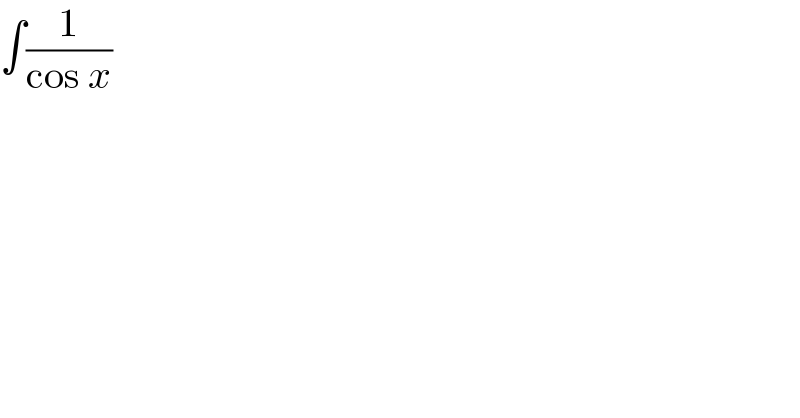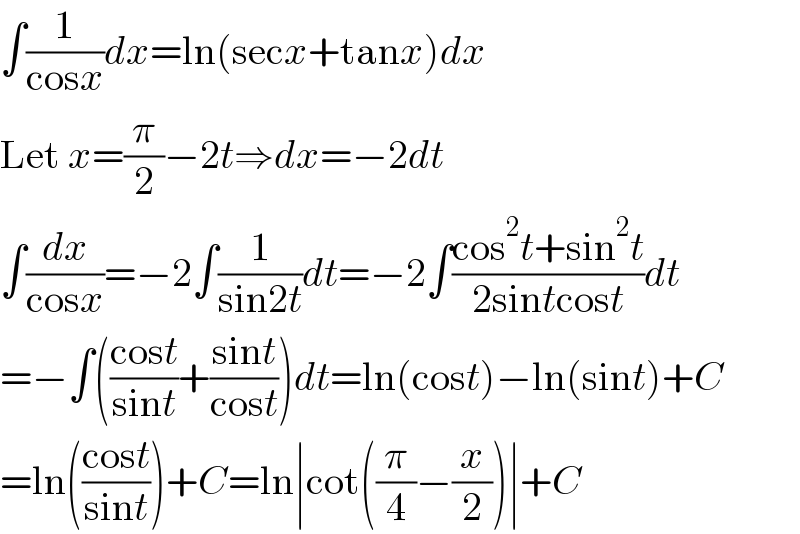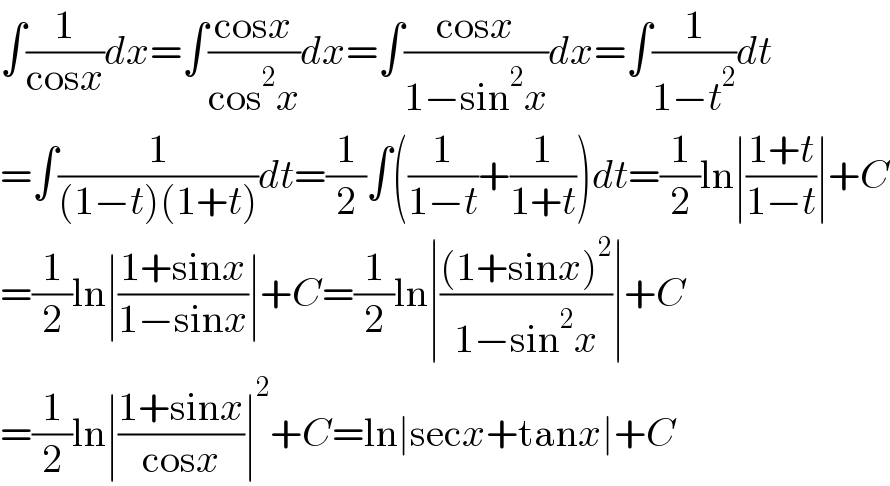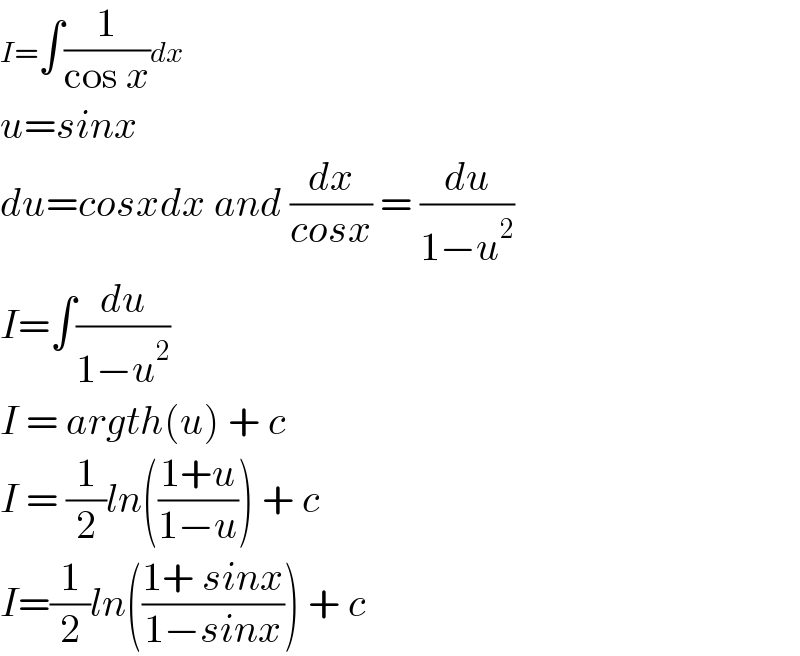Question Number 163829 by milandou last updated on 11/Jan/22

$$\int\frac{\mathrm{1}}{\mathrm{cos}\:{x}} \\ $$
Commented by MJS_new last updated on 11/Jan/22

$$\int{x}+{y}=? \\ $$$$\mathrm{maybe}\:\mathrm{use}\:\mathrm{proper}\:\mathrm{syntax}? \\ $$
Answered by Ar Brandon last updated on 11/Jan/22

$$\int\frac{\mathrm{1}}{\mathrm{cos}{x}}{dx}=\mathrm{ln}\left(\mathrm{sec}{x}+\mathrm{tan}{x}\right){dx} \\ $$$$\mathrm{Let}\:{x}=\frac{\pi}{\mathrm{2}}−\mathrm{2}{t}\Rightarrow{dx}=−\mathrm{2}{dt} \\ $$$$\int\frac{{dx}}{\mathrm{cos}{x}}=−\mathrm{2}\int\frac{\mathrm{1}}{\mathrm{sin2}{t}}{dt}=−\mathrm{2}\int\frac{\mathrm{cos}^{\mathrm{2}} {t}+\mathrm{sin}^{\mathrm{2}} {t}}{\mathrm{2sin}{t}\mathrm{cos}{t}}{dt} \\ $$$$=−\int\left(\frac{\mathrm{cos}{t}}{\mathrm{sin}{t}}+\frac{\mathrm{sin}{t}}{\mathrm{cos}{t}}\right){dt}=\mathrm{ln}\left(\mathrm{cos}{t}\right)−\mathrm{ln}\left(\mathrm{sin}{t}\right)+{C} \\ $$$$=\mathrm{ln}\left(\frac{\mathrm{cos}{t}}{\mathrm{sin}{t}}\right)+{C}=\mathrm{ln}\mid\mathrm{cot}\left(\frac{\pi}{\mathrm{4}}−\frac{{x}}{\mathrm{2}}\right)\mid+{C} \\ $$
Answered by Ar Brandon last updated on 11/Jan/22

$$\int\frac{\mathrm{1}}{\mathrm{cos}{x}}{dx}=\int\frac{\mathrm{cos}{x}}{\mathrm{cos}^{\mathrm{2}} {x}}{dx}=\int\frac{\mathrm{cos}{x}}{\mathrm{1}−\mathrm{sin}^{\mathrm{2}} {x}}{dx}=\int\frac{\mathrm{1}}{\mathrm{1}−{t}^{\mathrm{2}} }{dt} \\ $$$$=\int\frac{\mathrm{1}}{\left(\mathrm{1}−{t}\right)\left(\mathrm{1}+{t}\right)}{dt}=\frac{\mathrm{1}}{\mathrm{2}}\int\left(\frac{\mathrm{1}}{\mathrm{1}−{t}}+\frac{\mathrm{1}}{\mathrm{1}+{t}}\right){dt}=\frac{\mathrm{1}}{\mathrm{2}}\mathrm{ln}\mid\frac{\mathrm{1}+{t}}{\mathrm{1}−{t}}\mid+{C} \\ $$$$=\frac{\mathrm{1}}{\mathrm{2}}\mathrm{ln}\mid\frac{\mathrm{1}+\mathrm{sin}{x}}{\mathrm{1}−\mathrm{sin}{x}}\mid+{C}=\frac{\mathrm{1}}{\mathrm{2}}\mathrm{ln}\mid\frac{\left(\mathrm{1}+\mathrm{sin}{x}\right)^{\mathrm{2}} }{\mathrm{1}−\mathrm{sin}^{\mathrm{2}} {x}}\mid+{C} \\ $$$$=\frac{\mathrm{1}}{\mathrm{2}}\mathrm{ln}\mid\frac{\mathrm{1}+\mathrm{sin}{x}}{\mathrm{cos}{x}}\mid^{\mathrm{2}} +{C}=\mathrm{ln}\mid\mathrm{sec}{x}+\mathrm{tan}{x}\mid+{C} \\ $$
Answered by stelor last updated on 12/Jan/22

$${I}=\int\frac{\mathrm{1}}{\mathrm{cos}\:{x}}{dx} \\ $$$${u}={sinx} \\ $$$${du}={cosxdx}\:{and}\:\frac{{dx}}{{cosx}}\:=\:\frac{{du}}{\mathrm{1}−{u}^{\mathrm{2}} } \\ $$$${I}=\int\frac{{du}}{\mathrm{1}−{u}^{\mathrm{2}} } \\ $$$${I}\:=\:{argth}\left({u}\right)\:+\:{c} \\ $$$${I}\:=\:\frac{\mathrm{1}}{\mathrm{2}}{ln}\left(\frac{\mathrm{1}+{u}}{\mathrm{1}−{u}}\right)\:+\:{c} \\ $$$${I}=\frac{\mathrm{1}}{\mathrm{2}}{ln}\left(\frac{\mathrm{1}+\:{sinx}}{\mathrm{1}−{sinx}}\right)\:+\:{c} \\ $$
